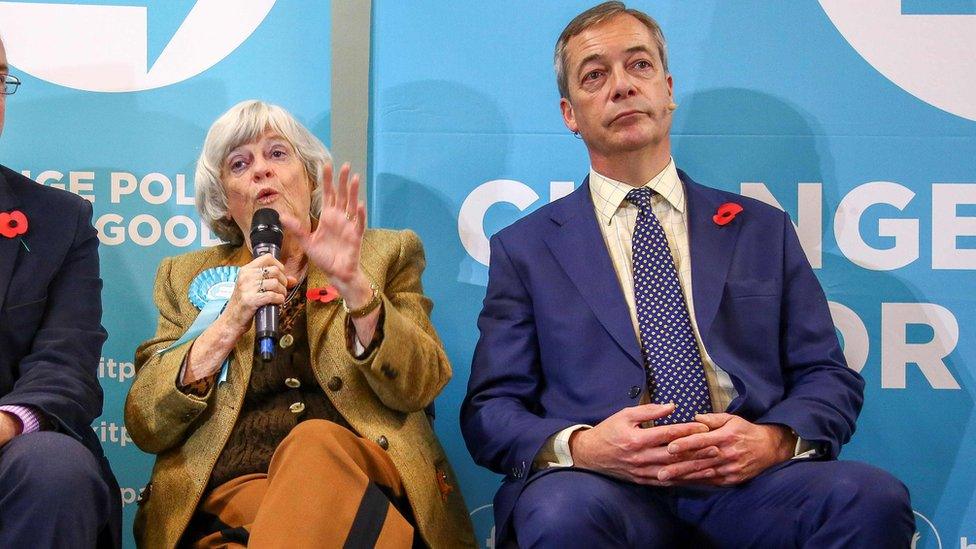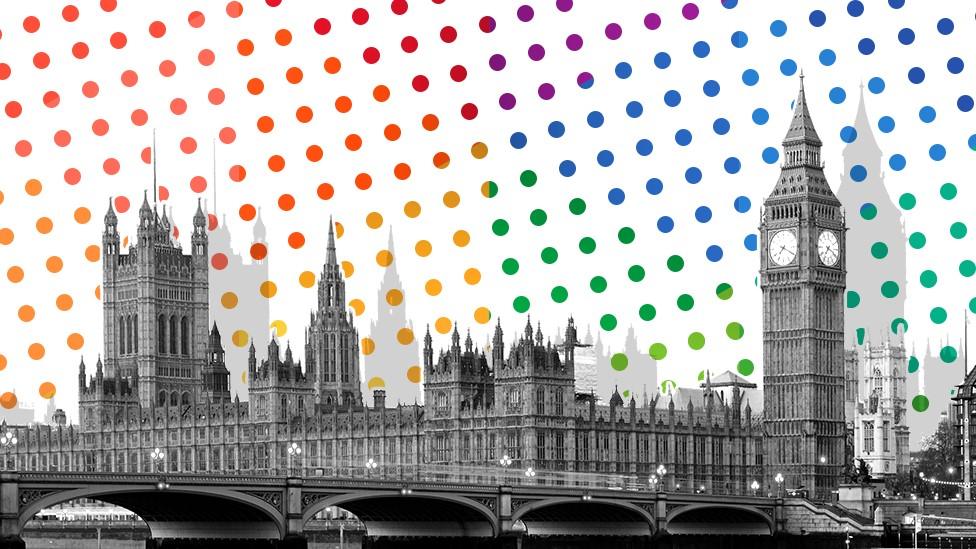General election 2019: Police 'assessing' call for peerage claim probe
- Published

Brexit Party candidate Ann Widdecombe and leader Nigel Farage both said they had been approached
Calls are growing for an investigation into claims the Tories offered peerages to Brexit Party election candidates to persuade them to stand down.
Police say they are assessing two allegations of electoral fraud.
Labour peer Lord Falconer has urged the Metropolitan Police and prosecution service to launch an investigation, saying the claims raised "serious questions" about the integrity of the 12 December election.
The PM says the claims are "nonsense".
"I am sure there are conversations that take place between politicians of all parties but certainly nobody's been offered a peerage," Boris Johnson said on Friday.
The claims - first made public by the Brexit Party's Nigel Farage - came after the Brexit Party announced it would not field candidates in any seats won by the Conservatives in 2017, to avoid splitting the pro-Brexit vote.
But the party said it would contest all other seats, prompting pressure from Conservatives who urged Mr Farage to withdraw more candidates to help Mr Johnson win a majority in Parliament.
Boris Johnson: "Nobody's been offered a peerage"
In a video posted on Twitter, external earlier this week, Mr Farage claimed he and eight other Brexit Party figures had been offered jobs "in the (Brexit) negotiating team and in government departments" while there had been "hints at peerages too".
Ann Widdecombe, a Brexit Party candidate, said she was prepared to swear on the Bible that she had been approached with an offer of "a role" in the next phase of Brexit negotiations.
A Conservative source also told the BBC that the Brexit Party candidate in Peterborough, Mike Greene, had been offered an unpaid role in education in the hope it would convince him to stand aside.
The Brexit Party candidate's team said Mr Greene would definitely be running in the Cambridgeshire constituency, which Labour held narrowly at a by-election in June.
'Exceptionally serious'
In a letter, Lord Falconer, the former Lord Chancellor, said he wanted to raise the issue "as a matter of urgency".
He wrote to Cressida Dick, the Met Police commissioner, and Max Hill, the director of public prosecutions, saying: "I believe these allegations raise serious questions about the integrity of the upcoming general election, and in particular whether senior individuals at CCHQ (Conservative Campaign Headquarters) or No 10 have breached two sections of the Representation of the People Act 1983."
Lord Falconer added: "These are exceptionally serious allegations which the DPP must, in accordance with his statutory duty, fully investigate as a matter of urgency.
"In addition, in order to maintain public confidence in the integrity of our electoral processes and this election, it is crucial that the Metropolitan Police also examine these accusations."
Speaking on the BBC's Today programme, Lord Falconer said: "The law is that if somebody corruptly induces or procures another person to withdraw from being a candidate at an election, that's both a crime and a corrupt practice in an election, which can lead an election to be set aside.
"From my point of view, it looks as if the Conservatives might be going well beyond electoral law in trying to win this election by persuading Brexit UK candidates not to stand."
Labour party chairman Ian Lavery said: "This could be political corruption of the highest order and, in addition to that, it could be seen as criminal activity."
He said there should "undoubtedly" be an investigation.
Responding to the claims, Liberal Democrat leader Jo Swinson said: "Nothing would surprise me about the Conservatives these days given what they've been prepared to do.
"If Boris Johnson's prepared to lie to the Queen, lie to the country, you know, I'm going to stop being shocked at where his lack of boundaries lies."
The SNP has also backed a probe into the allegations, insisting there should be an urgent inquiry by the Cabinet Office.
Tommy Sheppard, the SNP candidate for Edinburgh, called for a "full and frank investigation".
The Met Police said it was assessing two allegations of electoral fraud and malpractice in relation to the general election.
The lord chancellor is a role dating back many centuries, the holder of which is also head of the Ministry of Justice.
- Published13 November 2019

- Published6 December 2019
